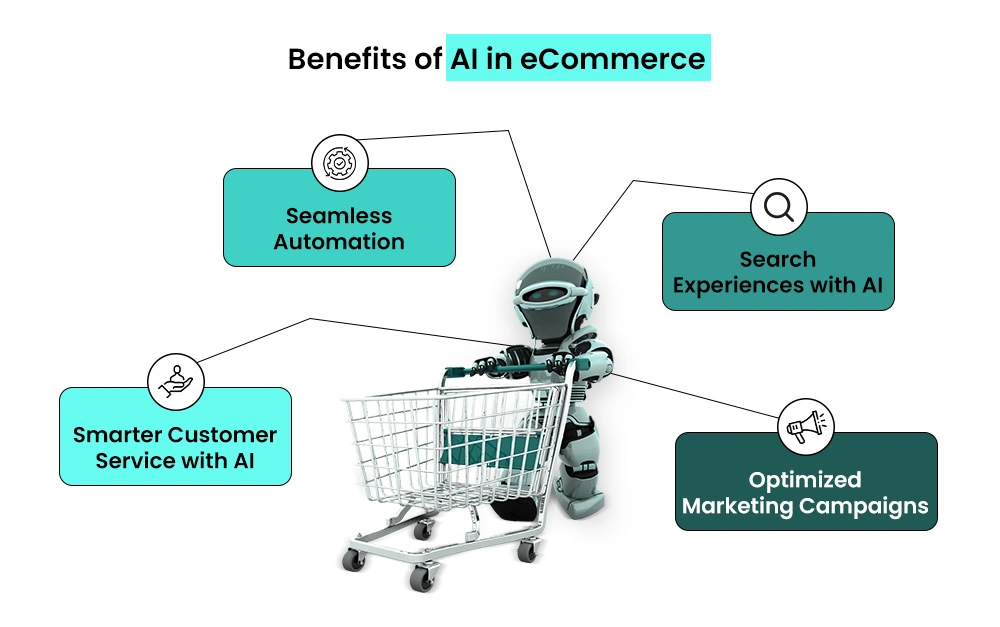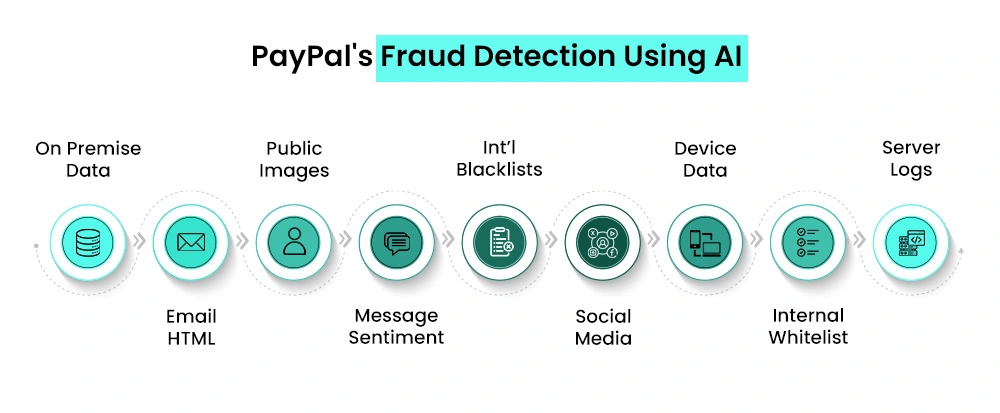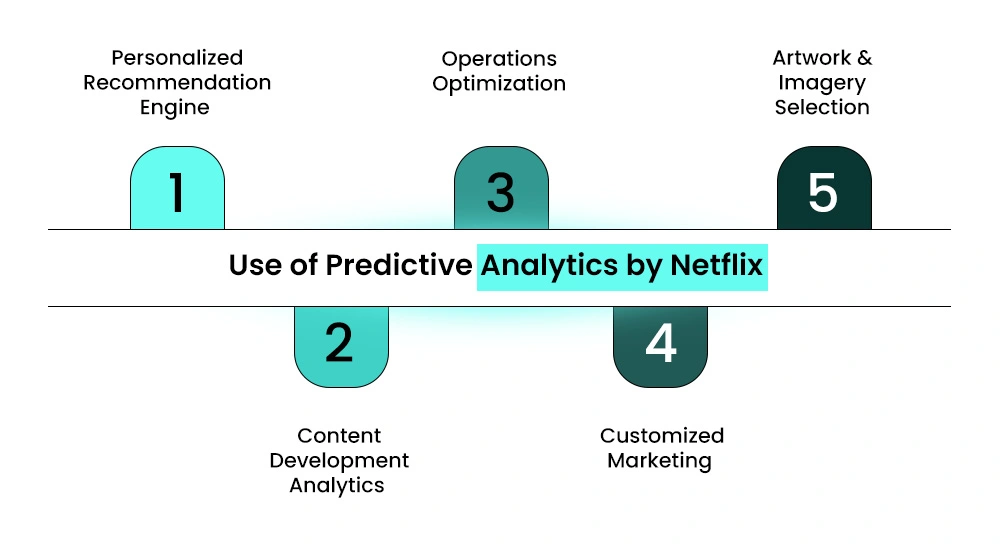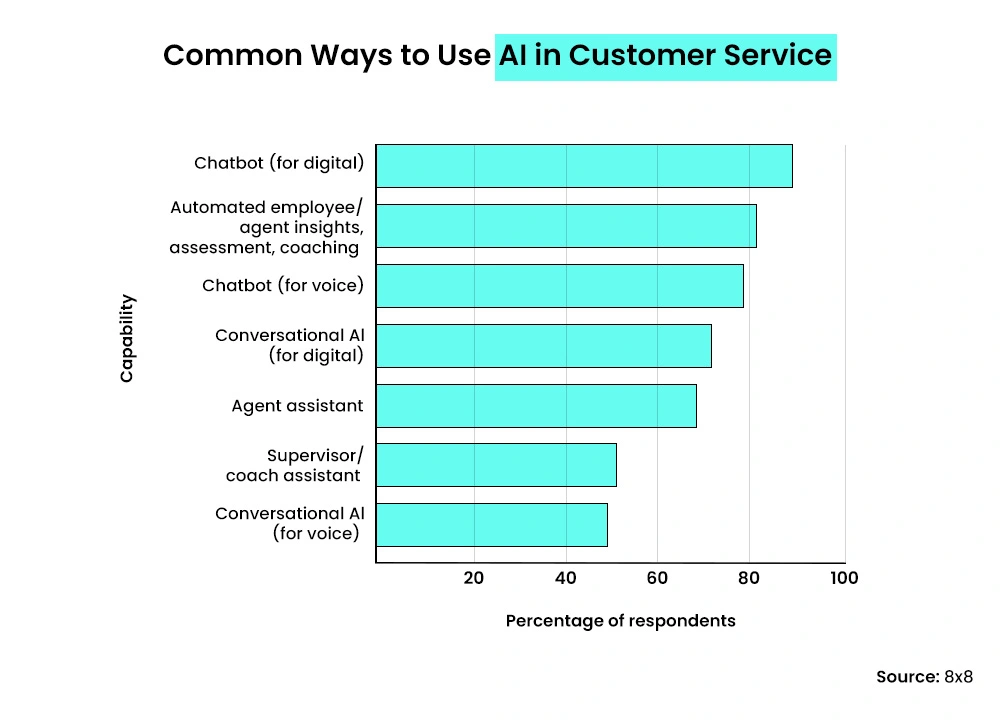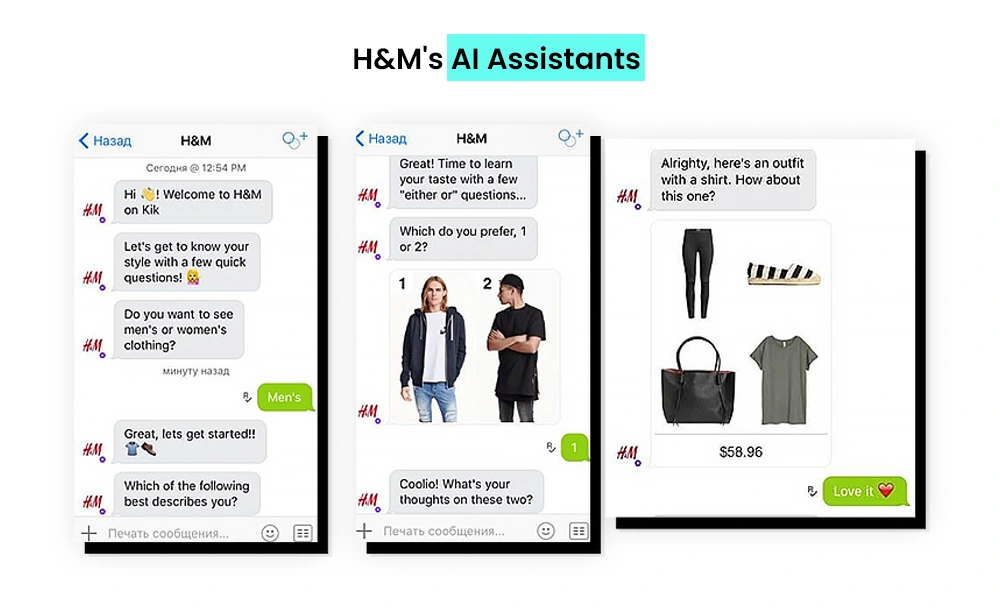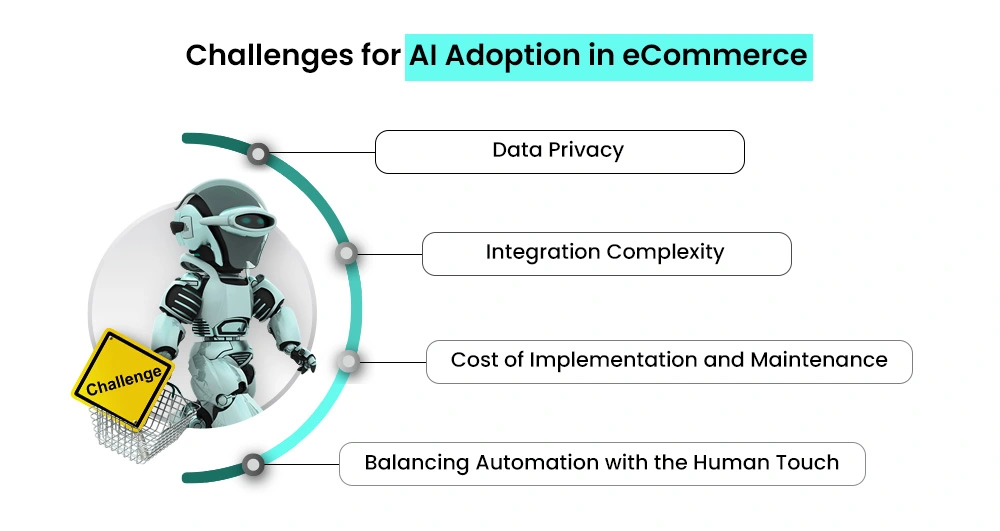How AI in eCommerce Is Revolutionizing Business Strategies in 2025?
AI in eCommerce isn’t just a trend; it’s rapidly becoming the backbone of how online businesses operate, compete, and scale. From intelligent product recommendations to real-time inventory optimization, artificial intelligence redefines the digital shopping experience.
With the AI-enabled eCommerce market projected to reach $22.6 billion by 2032, the urgency for brands to adapt is more real than ever.
As we move through 2025, businesses that fail to leverage AI will struggle to meet rising consumer expectations for speed, personalization, and convenience. This blog dives into how AI in eCommerce is reshaping core business strategies from hyper-personalized marketing and dynamic pricing to smarter automation and deeper customer insights.
We’ll explore the most impactful AI applications, discuss what forward-thinking brands are doing right, and offer practical insights for companies ready to future-proof their online presence. If staying competitive and scaling smarter is your goal, understanding this AI-powered shift is no longer optional; it’s essential.
Understanding the Role of AI in eCommerce
AI has become the engine behind smarter, faster, and more profitable eCommerce businesses. Artificial intelligence in eCommerce refers to the use of machine learning, data analysis, and automation to improve everything from product recommendations to customer service and inventory forecasting.
But now, generative AI in eCommerce is taking things even further, enabling businesses to create dynamic content, personalized messaging, and even visual assets at scale.
Traditional methods of running an online store, manual campaigns, basic segmentation, and static content simply can’t keep up with evolving consumer expectations. Customers want personalized experiences, quick support, and seamless journeys across channels. That’s where AI steps in. It helps brands anticipate needs, optimize operations, and craft meaningful interactions.
For businesses aiming to stay ahead in 2025, embracing AI isn’t just a tech upgrade; it’s a strategic necessity. Innovation is no longer optional; it’s the gateway to sustained growth and competitive advantage.
– Also Read- Top 10 Ecommerce Trends You Should Know in 2025
Benefits of AI in eCommerce for Businesses
There are numerous benefits of AI in eCommerce that not only reduce manual effort but also enhance efficiency and reduce costs. From smarter automation to deeper customer insights, AI in eCommerce is reshaping how online businesses operate and thrive. Let’s explore the most impactful advantages driving this transformation:
1. Smarter Customer Service with AI
Machine learning is transforming how eCommerce brands connect with their customers. By analyzing browsing habits, past purchases, and behavioral patterns, AI can deliver personalized product recommendations that genuinely match individual preferences.
This level of personalization doesn’t just improve the shopping experience; it builds stronger emotional connections. When visitors land on your site and instantly see products that feel handpicked just for them, it’s easier to capture attention and drive conversions.
With AI, brands can engage customers one-on-one with tailored messages and offers that truly stand out in a crowded marketplace.
2. Seamless Automation
Automation in eCommerce isn’t just about saving time; it’s about scaling smarter. Whether it’s scheduling emails, managing inventory, or sending loyalty discounts, using AI in eCommerce helps eliminate repetitive tasks and streamline daily operations.
AI-driven tools can handle everything from personalized product recommendations to automated customer support, ensuring your store runs smoothly while you focus on growth.
As machine learning evolves, so does your ability to predict customer needs, automate easy tasks, and improve efficiency without lifting a finger. In 2025, automation powered by AI won’t be a luxury; it’ll be a necessity for staying ahead.
3. Search Experiences with AI
Finding products is no longer limited to typing keywords. Thanks to machine learning algorithms and generative AI, eCommerce platforms now offer intelligent search experiences that are fast, intuitive, and accurate.
Here’s how AI is reshaping product discovery:
- Visual Search: Shoppers can upload an image, and the AI scans it to find visually similar items across the store, turning inspiration into instant results.
- Voice Search: Especially helpful for mobile users, voice-enabled search lets customers speak their queries and receive accurate product suggestions in return.
- Contextual Understanding: AI-powered systems grasp user intent better than ever, delivering relevant results based on behavior, preferences, and past searches.
By integrating these smart features, brands enhance the customer journey and make product discovery effortless.
4. Optimized Marketing Campaigns
Marketing is no longer about guesswork; AI in eCommerce makes it precise and personal. By analyzing user behavior, purchase history, and engagement patterns, AI helps brands deliver the right message to the right person at the perfect time.
Here’s how it levels up your marketing:
- Identifies ideal channels and timing for each customer
- Craft messages that truly resonate based on preferences and behavior
- Continuously optimizes campaigns for higher engagement and better ROI
This smart targeting doesn’t just boost conversions; it enhances the overall user experience, making your brand feel more in tune with your audience’s needs.
How AI is Transforming Business Strategies?
Wondering how to use AI in eCommerce effectively? AI is transforming the industry by streamlining operations and delivering smarter, personalized customer experiences that boost engagement and business performance. Here’s a deeper look:
1. Personalized Shopping Experience
AI in eCommerce is redefining how businesses engage with customers by creating personalized, one-to-one shopping journeys at scale. With consumers expecting brands to understand their preferences, personalization has become a non-negotiable.
Studies show businesses that deliver tailored experiences see up to 40% more revenue. However, only 1 in 10 retailers has fully embraced personalization across all channels, highlighting a massive opportunity.
Here’s how AI makes it happen:
- Tracks customer behavior like search activity, purchase history, and browsing patterns
- Uses this data to serve personalized product recommendations
- Dynamically adapts content such as offers, product descriptions, and emails based on individual preferences
Take Sephora, for example; both brands leverage AI to suggest products users are likely to love, often before customers realize they need them. AI even refines product suggestions in real-time, responding to how customers interact during a session.
By using AI to enhance personalization, eCommerce businesses can build stronger relationships, improve conversion rates, and encourage repeat purchases. This is making personalization not just a nice-to-have, but a vital strategy for staying competitive in 2025.
– Also Read- Ecommerce Video Marketing: What Works And What’s Next
2. Intelligent Automation in Operations
As AI in B2B eCommerce evolves, it’s transforming backend operations with smarter, faster, and more reliable automation. For many eCommerce businesses, inventory management, order processing, and fulfillment can become overwhelming, especially during seasonal spikes or unexpected demand. AI steps in to simplify it all.
Here’s how AI streamlines operations:
- Predictive Inventory Management: AI tools forecast demand based on past purchase patterns, market trends, and seasonality. Brands like Zara use AI to anticipate customer demand and adjust inventory across stores in real-time.
- Real-Time Stock Tracking: Businesses can automatically monitor product availability and trigger reorders, eliminating costly stockouts or excess.
- Automated Workflows: From processing payments to handling shipping and returns, AI-powered systems ensure smooth execution without human intervention.
- Fraud Detection and Prevention: Machine learning algorithms analyze purchase behavior to spot anomalies instantly. PayPal, for instance, uses AI to monitor transactions and flag suspicious activity, reducing fraud and safeguarding customer trust.
For businesses invested in online shopping experiences, AI isn’t just a tool—it’s a strategic asset that ensures operational efficiency, customer satisfaction, and long-term growth.
3. Predictive Analytics for Smarter Decision-Making
As AI in eCommerce evolves, predictive analytics is becoming a critical part of smarter business strategies. With more customers interacting across digital touchpoints, brands need real-time insights to stay competitive and agile.
AI-powered predictive analytics allows businesses to analyze vast amounts of data, including purchase history, browsing patterns, and market trends, to anticipate demand with accuracy.
Here’s how predictive analytics is reshaping eCommerce:
- Demand Forecasting: AI helps brands predict product demand by evaluating historical sales, seasonal shifts, and social signals, minimizing stockouts and overstocking.
- Trend Spotting: By continuously monitoring digital channels and customer data, AI identifies emerging preferences and product interests before they hit the mainstream.
- Inventory Optimization: AI-driven systems automatically adjust restocking schedules and distribution based on predicted buying behavior.
- Targeted Marketing & Pricing: Brands such as Netflix use predictive models to personalize offers and dynamically adjust pricing for better ROI and customer retention.
With predictive analytics, eCommerce businesses are no longer reacting, they’re anticipating because it is the new competitive advantage.
4. Conversational Commerce and AI-Powered Customer Support
The rise of conversational AI in eCommerce is transforming how brands interact with shoppers by offering instant, intelligent, and highly personalized customer support around the clock. Today, AI-powered chatbots manage 30% of live chat communications and 80% of routine tasks.
The global eCommerce market has surged to $5.92 trillion with generative AI, largely due to brands enhancing their support systems to deliver smarter, faster experiences.
Here’s how conversational AI is reshaping customer engagement:
- Conversational Shopping: Assistants now engage users across the site from the homepage to checkout by sharing tips, offering bundles, or even predicting preferences. (e.g., recommending a smaller size based on reviews)
- Voice & Visual Commerce: AI enables natural language processing and visual search to make shopping as seamless as talking to a friend.
- 24/7 Support & Instant Problem Solving: Brands like H&M use AI assistants to offer real-time help, be it tracking orders, answering questions, or resolving issues without human intervention.
With smarter conversations and deeper personalization, AI isn’t just supporting customers—it’s shaping the entire buying journey.
– Also Read- Consumer Behavior in eCommerce: Key Insights, Impact, and Strategies for Growth
5. Streamline Marketing and Advertising
AI in marketing is changing the game for eCommerce brands by turning guesswork into precision. With the ability to analyze massive datasets in real-time, AI enables smarter decisions that enhance ROI and boost engagement across the board.
Here’s how AI is powering targeted advertising and campaign optimization:
- Hyper-Targeted Ads: Platforms like Facebook Ads and Google Ads use AI to deliver personalized ads based on user behavior, location, and interests. This ensures the right message reaches the right audience at the right time.
- Real-Time Campaign Adjustments: AI tools like AdRoll and Smartly.io can tweak creatives, bids, and placements on the fly based on what’s performing best, maximizing returns without manual effort.
- Customer Segmentation Made Smarter: AI groups customers based on habits, preferences, and purchase history, helping brands create tailored journeys for each segment.
- Marketing Automation: From email flows to retargeting, AI streamlines repetitive tasks while ensuring personalized engagement at scale.
With AI in marketing, businesses aren’t just pushing messages; they’re building meaningful, data-driven connections. Success will come to those who leverage AI to meet evolving customer needs with speed, relevance, and creativity.
– Also Read- Ecommerce CRO: Start Winning Customers In 2025
Challenges and Ethical Considerations for AI Adoption in eCommerce
AI in e-commerce faces key challenges like ensuring accurate data analysis, protecting customer privacy, and continuously evolving algorithms to match shifting buyer behavior and market trends. Staying ahead requires constant refinement and trust-first strategies.
1. Data Privacy
Adopting AI technology in eCommerce isn’t without its challenges, especially when it comes to ethics and data integrity. Businesses must address issues like:
- Data privacy concerns- With customers expecting their personal info to be handled with care.
- Data scarcity and messiness- This can limit AI’s ability to deliver accurate insights.
- Algorithmic bias- This can unintentionally manipulate results and harm user trust.
These limitations can slow progress, but they’re not major issues. With ongoing innovation and AI practices, brands can navigate these challenges and use the potential of AI, transforming how they connect with customers and drive smarter strategies.
2. Integration Complexity
Integrating AI in eCommerce isn’t always easy; it can be complex, especially when syncing with legacy systems. Retailers often face:
- Compatibility issues between old platforms and new AI tools
- Data silos, making it tough to get a unified, real-time view of operations
- High implementation costs and the need for skilled tech teams
Real-time decision-making is one of AI’s biggest strengths, but without seamless integration, its full potential gets delayed. To truly benefit, businesses need flexible, scalable infrastructures and a clear roadmap for AI adoption that minimizes disruption while maximizing long-term gains.
3. Cost of Implementation and Maintenance
Investing in AI for eCommerce isn’t just about buying software; it’s a long-term commitment. From setup to maintenance, costs can add up quickly. Businesses need to budget for AI tools, staff training, and regular updates to keep systems running smoothly.
Hiring experts to manage data and turn it into actionable insights is also key, and that adds to the expense. While it might seem like a big investment upfront, the right use of AI can lead to smarter decisions, better customer experiences, and increased sales. With a clear strategy, even growing brands can adopt AI without spending much.
4. Balancing Automation with the Human Touch
As Artificial Intelligence takes over more tasks in eCommerce, it’s important not to lose the human touch. While AI can handle things like customer queries, recommendations, and even inventory management, people still want to feel heard and understood.
Striking the right balance means using AI for speed and efficiency, but keeping real people available for complex or emotional interactions. Over-automation can make your brand feel cold or robotic.
The key is to blend smart technology with human empathy by creating a shopping experience that’s both efficient and personal, especially as customers continue to value authenticity.
– Also Read- How eCommerce Agencies Help You Keep Up With Trends?
Future Trends and the Evolving Role of AI in eCommerce Beyond 2025
As we look beyond 2025, the role of AI in eCommerce is only set to grow deeper, smarter, and more personalized. AI won’t just be a tool for automation; it’ll be a strategic partner in driving customer experience, product innovation, and business growth.
Here’s what the future of AI in eCommerce is:
- Hyper-personalization at scale: AI will go beyond basic recommendations, delivering real-time, deeply tailored shopping experiences based on behavior, preferences, and even mood.
- Predictive commerce: Expect AI to predict what customers need before they even search, offering curated selections, replenishment reminders, or deals proactively.
- AI-powered voice and visual search: With advancements in natural language processing and image recognition, customers will shop using their voice or camera more than their keyboard.
- Ethical AI and transparency: As consumers become more aware of data use, brands will need to ensure ethical AI practices, being transparent about how AI influences choices.
The role of AI in eCommerce will evolve from a behind-the-scenes tool to a front-facing experience enhancer. For businesses willing to embrace innovation while staying customer-first, the future of AI holds massive potential to redefine how people discover, interact with, and buy products online.
– Also Read- How to Use User-Generated Content in eCommerce Marketing?
Conclusion
In 2025, AI in eCommerce is more than a trend, it’s a game-changer. From personalized shopping experiences to smarter operations and data-driven strategies, AI is helping businesses stay ahead in a competitive market.
But success doesn’t just come from using the latest tools; it comes from using them wisely. Brands that balance technology with a human touch, invest in ethical practices, and stay adaptable will lead the way.
As AI continues to evolve, the possibilities are endless. Now’s the time to embrace the shift, rethink your strategy, and let AI in eCommerce drive your business into the future.
Reach out to us at Mastroke for better marketing strategies to implement AI in your business growth.
